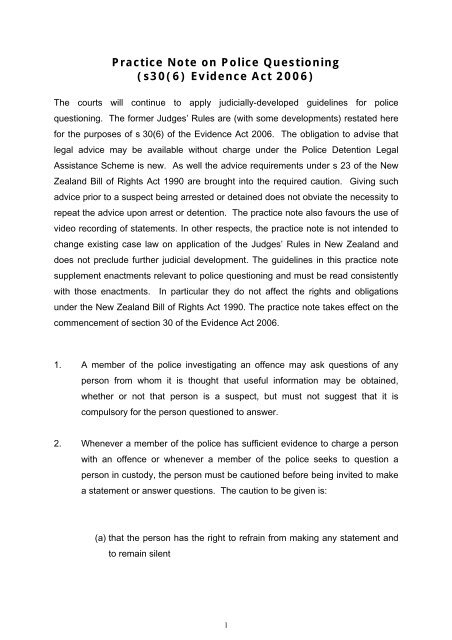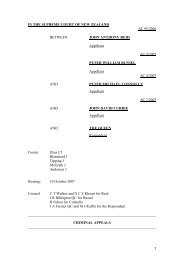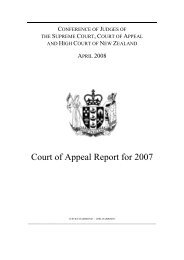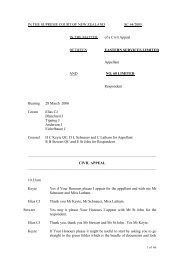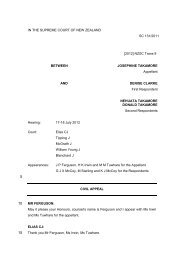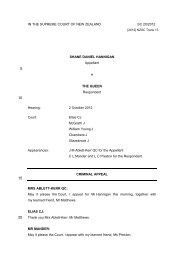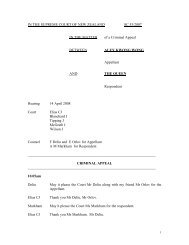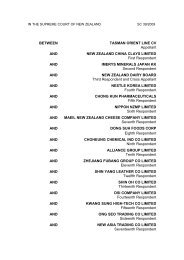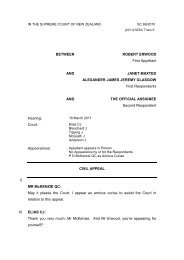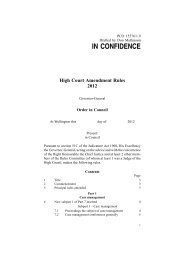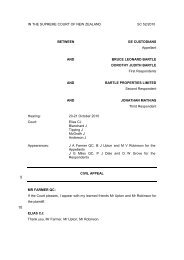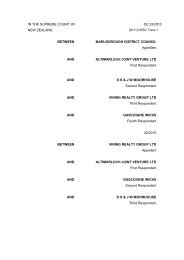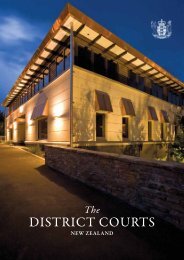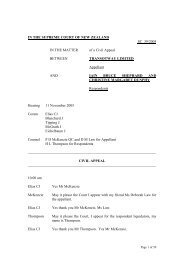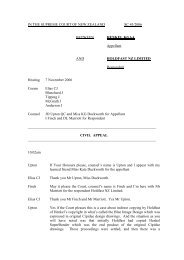Practice Note on Police Questioning - Courts of New Zealand
Practice Note on Police Questioning - Courts of New Zealand
Practice Note on Police Questioning - Courts of New Zealand
You also want an ePaper? Increase the reach of your titles
YUMPU automatically turns print PDFs into web optimized ePapers that Google loves.
<str<strong>on</strong>g>Practice</str<strong>on</strong>g> <str<strong>on</strong>g>Note</str<strong>on</strong>g> <strong>on</strong> <strong>Police</strong> Questi<strong>on</strong>ing<br />
(s30(6) Evidence Act 2006)<br />
The courts will c<strong>on</strong>tinue to apply judicially-developed guidelines for police<br />
questi<strong>on</strong>ing. The former Judges’ Rules are (with some developments) restated here<br />
for the purposes <strong>of</strong> s 30(6) <strong>of</strong> the Evidence Act 2006. The obligati<strong>on</strong> to advise that<br />
legal advice may be available without charge under the <strong>Police</strong> Detenti<strong>on</strong> Legal<br />
Assistance Scheme is new. As well the advice requirements under s 23 <strong>of</strong> the <strong>New</strong><br />
<strong>Zealand</strong> Bill <strong>of</strong> Rights Act 1990 are brought into the required cauti<strong>on</strong>. Giving such<br />
advice prior to a suspect being arrested or detained does not obviate the necessity to<br />
repeat the advice up<strong>on</strong> arrest or detenti<strong>on</strong>. The practice note also favours the use <strong>of</strong><br />
video recording <strong>of</strong> statements. In other respects, the practice note is not intended to<br />
change existing case law <strong>on</strong> applicati<strong>on</strong> <strong>of</strong> the Judges’ Rules in <strong>New</strong> <strong>Zealand</strong> and<br />
does not preclude further judicial development. The guidelines in this practice note<br />
supplement enactments relevant to police questi<strong>on</strong>ing and must be read c<strong>on</strong>sistently<br />
with those enactments. In particular they do not affect the rights and obligati<strong>on</strong>s<br />
under the <strong>New</strong> <strong>Zealand</strong> Bill <strong>of</strong> Rights Act 1990. The practice note takes effect <strong>on</strong> the<br />
commencement <strong>of</strong> secti<strong>on</strong> 30 <strong>of</strong> the Evidence Act 2006.<br />
1. A member <strong>of</strong> the police investigating an <strong>of</strong>fence may ask questi<strong>on</strong>s <strong>of</strong> any<br />
pers<strong>on</strong> from whom it is thought that useful informati<strong>on</strong> may be obtained,<br />
whether or not that pers<strong>on</strong> is a suspect, but must not suggest that it is<br />
compulsory for the pers<strong>on</strong> questi<strong>on</strong>ed to answer.<br />
2. Whenever a member <strong>of</strong> the police has sufficient evidence to charge a pers<strong>on</strong><br />
with an <strong>of</strong>fence or whenever a member <strong>of</strong> the police seeks to questi<strong>on</strong> a<br />
pers<strong>on</strong> in custody, the pers<strong>on</strong> must be cauti<strong>on</strong>ed before being invited to make<br />
a statement or answer questi<strong>on</strong>s. The cauti<strong>on</strong> to be given is:<br />
(a) that the pers<strong>on</strong> has the right to refrain from making any statement and<br />
to remain silent<br />
1
(b) that the pers<strong>on</strong> has the right to c<strong>on</strong>sult and instruct a lawyer without delay<br />
and in private before deciding whether to answer questi<strong>on</strong>s and that such<br />
right may be exercised without charge under the <strong>Police</strong> Detenti<strong>on</strong> Legal<br />
Assistance Scheme.<br />
(c) that anything said by the pers<strong>on</strong> will be recorded and may be given in<br />
evidence.<br />
3. Questi<strong>on</strong>s <strong>of</strong> a pers<strong>on</strong> in custody or in respect <strong>of</strong> whom there is sufficient<br />
evidence to lay a charge must not amount to cross-examinati<strong>on</strong>.<br />
4. Whenever a pers<strong>on</strong> is questi<strong>on</strong>ed about statements made by others or about<br />
other evidence, the substance <strong>of</strong> the statements or the nature <strong>of</strong> the evidence<br />
must be fairly explained.<br />
5. Any statement made by a pers<strong>on</strong> in custody or in respect <strong>of</strong> whom there is<br />
sufficient evidence to charge should preferably be recorded by video recording<br />
unless that is impractical or unless the pers<strong>on</strong> declines to be recorded by video.<br />
Where the statement is not recorded by video, it must be recorded permanently<br />
<strong>on</strong> audio tape or in writing. The pers<strong>on</strong> making the statement must be given an<br />
opportunity to review the tape or written statement or to have the written<br />
statement read over, and must be given an opportunity to correct any errors or<br />
add anything further. Where the statement is recorded in writing, the pers<strong>on</strong> must<br />
be asked if he or she wishes to c<strong>on</strong>firm the written record as correct by signing it.<br />
Sian Elias<br />
Chief Justice<br />
16 July 2007<br />
2


